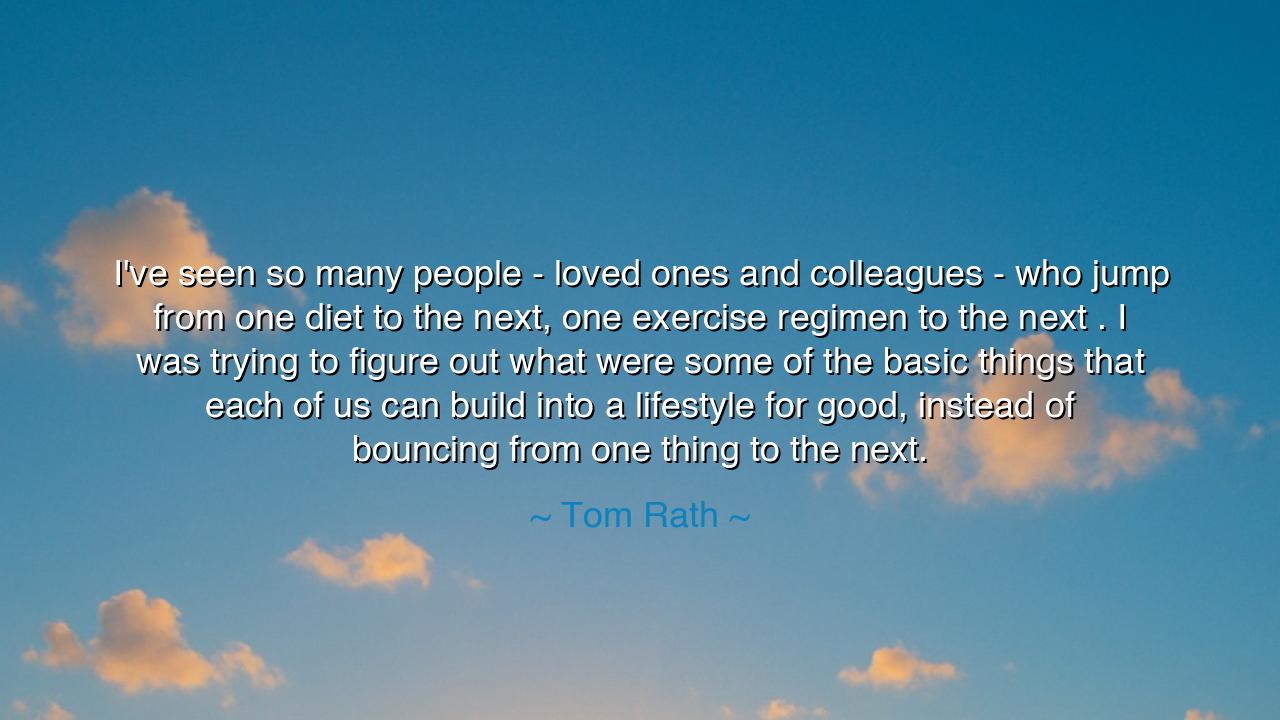
I've seen so many people - loved ones and colleagues - who jump
I've seen so many people - loved ones and colleagues - who jump from one diet to the next, one exercise regimen to the next . I was trying to figure out what were some of the basic things that each of us can build into a lifestyle for good, instead of bouncing from one thing to the next.






In the grand journey of life, there is a timeless truth that resonates through the wisdom of the ancients: to find true health and well-being, we must seek balance and consistency, not the transient promises of fleeting trends. Tom Rath speaks to this in his reflection on the behaviors he has witnessed: "I've seen so many people - loved ones and colleagues - who jump from one diet to the next, one exercise regimen to the next. I was trying to figure out what were some of the basic things that each of us can build into a lifestyle for good, instead of bouncing from one thing to the next." Rath’s words carry with them an ancient wisdom—health is not found in extremes, but in practices that we build steadily, day by day, into our lives. The ancient philosophers knew that true strength comes not from chasing the next best thing but from cultivating habits that endure and strengthen us.
The ancient Greeks, whose teachings still echo in the chambers of our minds today, understood the importance of moderation and habit. Aristotle, the great philosopher, taught that to live a virtuous life is to live a life of balance—a life where habits are the foundation of both physical and mental well-being. He believed that the pursuit of virtue required consistent actions, actions that shape the character and the body in ways that allow one to thrive in harmony with the world. Just as Aristotle taught the value of steady, moderate efforts over time, so too does Tom Rath urge us to build a lifestyle of enduring practices—diets and exercise regimens that align with our nature and not with the ever-changing tides of the latest trends.
Consider the story of Hercules, whose twelve labors were not just feats of strength but tests of consistency. Each task required Hercules to persevere against great odds, but it was his unwavering dedication to the process—not a single, fleeting effort—that brought him success. Rath’s insight into the failure of jumping from one thing to another mirrors the error of chasing temporary victories instead of building long-term strength. Just as Hercules learned that true heroism came not from dramatic bursts of strength but from consistent action over time, so too must we recognize that true health comes from building sustainable habits that last.
In the story of Socrates, we find another ancient figure who emphasized the power of consistent practice. Known for his wisdom and restraint, Socrates lived a life of balance, not seeking extremes but embracing the middle path—the path of thoughtful, measured actions that created harmony in his body and soul. Socrates’ commitment to reasoning, questioning, and living simply is a powerful metaphor for how we must approach our own lives. Rather than chasing after each new diet or exercise regimen, we must build a life that is rooted in steady, mindful habits. Like Socrates, we must cultivate practices that honor our bodies and minds, practices that will guide us toward lasting health and fulfillment.
The ancient Romans also recognized the importance of balance in life. Seneca, a Stoic philosopher, taught that the key to a virtuous life lay in the ability to live with consistency and purpose. His teachings on self-discipline and moderation align with Rath’s advice. Seneca believed that health was not about extreme measures, but about living wisely and consistently, choosing habits that would lead to peace and strength. The Romans knew that in order to lead a life of fulfillment, one must not chase after temporary solutions, but instead develop habits that nurture both the body and the soul over time.
Consider the practices of ancient yogis in India, who understood the power of consistency in their spiritual and physical disciplines. The yogic path is one of steady, mindful action—where each asana, each breath, and each moment of awareness builds upon the last. The yogis did not seek instant transformation, but instead committed to a path of steady growth and discipline that led to a deep sense of inner peace and strength. In this, they reflect the wisdom that Rath speaks of: true health is not about the quick fix but about building habits that serve us in the long run.
In your own life, consider Rath’s insight as a guide to cultivating lasting health and well-being. Rather than chasing the fleeting promises of the next diet or exercise trend, seek to build a lifestyle of balance—one that favors consistency over extremes, mindfulness over quick fixes, and habits that honor your body and mind. Reflect on the lessons of the ancients, whose wisdom teaches us that true strength lies not in dramatic bursts, but in the steady, consistent actions that create a life of purpose and peace. Let us embrace the wisdom of moderation, not only in our diet and exercise but in all aspects of our lives. Through consistency and balance, we can build a life that nourishes us, both now and in the years to come.






AAdministratorAdministrator
Welcome, honored guests. Please leave a comment, we will respond soon